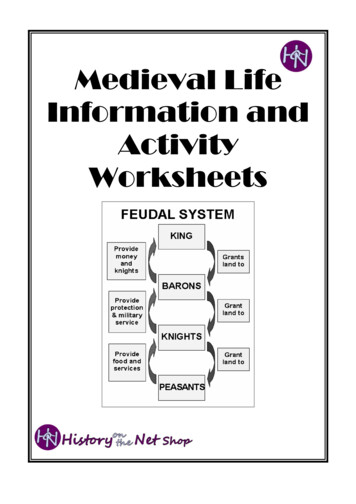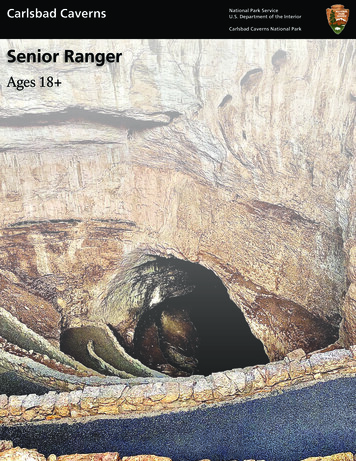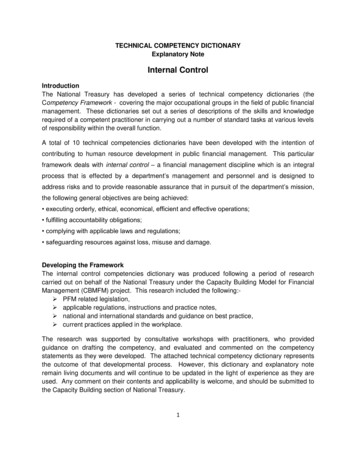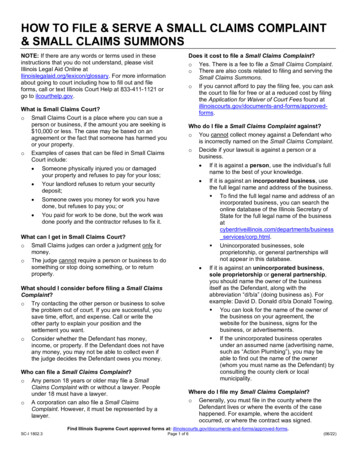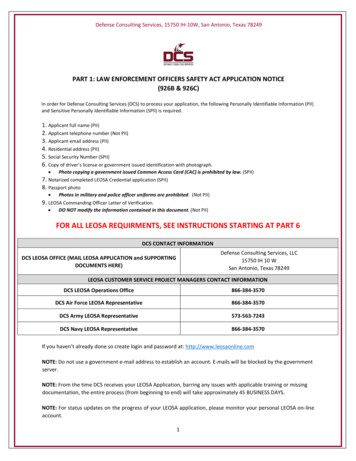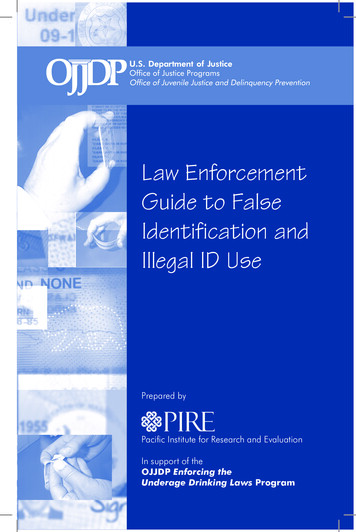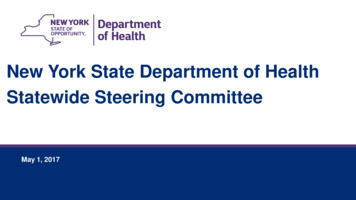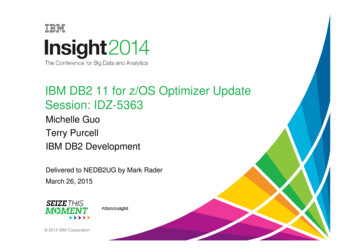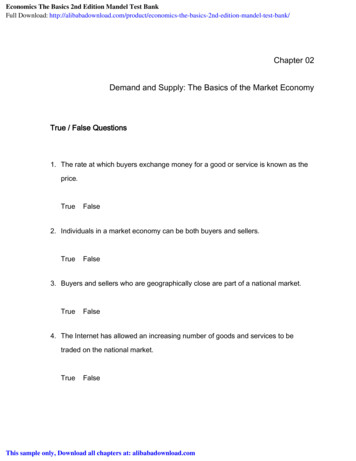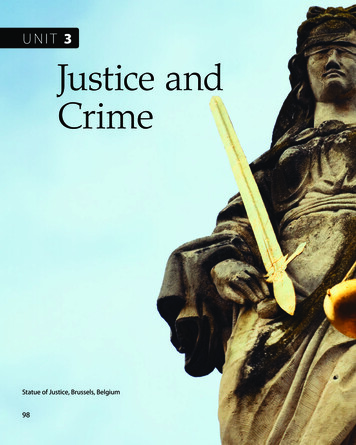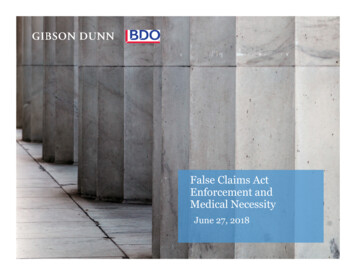
Transcription
False Claims ActEnforcement andMedical NecessityJune 27, 2018
MCLE Certificate Information Most participants should anticipate receiving their certificate of attendance infour weeks following the webcast. Virginia Bar Association members should anticipate receiving their certificateof attendance in six weeks following the webcast. All questions regarding MCLE Information should be directed to JeanineMcKeown (National Training Administrator) at 213–229-7140 orjmckeown@gibsondunn.com.2
Agenda1.FCA and Medical Necessity Overview2.Medical Necessity Enforcement TrendsA.Health Care ProvidersB.Drug & Medical Device Companies3.Recent Case Law Developments4.Medical Necessity and The Brand Memo5.An Expert's PerspectiveA.Practical Lessons from Expert Chart ReviewsB.Role and Evolution of Payor Reimbursement Policies6.Questions3
FCA & Medical NecessityOverview
The False Claims Act (FCA) The FCA, 31 U.S.C. §§ 3729-3733, is the federal government's primary weapon toredress fraud. The FCA provides for recovery of civil penalties and treble damages. The FCA requires “knowing" conduct, defined as (1) actual knowledge, (2) deliberateignorance, or (3) reckless disregard.31 U.S.C.§ 3729(a)(1)Statutory ProhibitionSummary(A)Knowingly presents, or causes to be presented, afalse or fraudulent claim for payment or approvalFalse/Fraudulent Claim(B)Knowingly makes, uses or causes to be made orused, a false record or statement material to afalse or fraudulent claimFalse Record/Statement(C)Knowingly conceals or knowingly and improperlyavoids or decreases an obligation to pay ortransmit money or property to the Government"Reverse" False Claim(G)Conspires to violate a liability provision of theFCAConspiracy5
Overview of Key FCA TheoriesFactual Falsity False billing (e.g., services notprovided)Overbilling (e.g., upcoding)Promissory Fraud / Fraud in theInducement Obtaining a contract through falsestatements or fraudulent conductU.S. ex rel. Marcus v. Hess, 317 U.S.537 (1943) (claims by contractors whocolluded on bids)Legal Falsity Express certification of compliancewith legal requirementsSubmission of claim withrepresentations rendered misleadingas to goods / services providedReverse False Claims Improper avoidance of obligation topay money to the governmentRetention of governmentoverpayment6
Key Legal Theories1. Improper Financial Relationships AKS / Stark Law Providing anything of value to inducereferrals or other business2. Billing / Coding / Coverage False billing (e.g., billing for servicesnot provided) Overbilling (e.g., upcoding)3. Medical Necessity4. Quality of Care Providing services that are notmedically necessary Providing substandard care (e.g.,using unqualified personnel) Inflating volume or value of servicesprovided (e.g., inpatient rather thanoutpatient care) Charging the government for"worthless" services5. Overpayments Nexus of "reverse FCA" and the ACA60-Day Rule7
Medical Necessity In Medicare, concept of "medical necessity" is derived from statute. "No payment may be made. . . for any expenses incurred for items or services, which . . . are notreasonable and necessary for the diagnosis or treatment of illness or injury or to improvethe functioning of a malformed body member." 42 U.S.C. § 1395y(a)(1)(A) (Part A & Part B)Similar definition for Part D In Medicaid, "medical necessity" is a federal and state law requirement. For children, the Early and Periodic Screening, Diagnostic and Treatment Services ("EPSDT")provision of the Medicaid Act, 42 U.S.C. § 1396d(r), requires states to provide "necessaryhealth care."Otherwise, "medical necessity is not explicitly denoted in the Medicaid Act, [but] it has becomea judicially accepted component of the federal legislative scheme." Moore ex rel. Moore v.Reese, 637 F.3d 1220, 1232 (11th Cir. 2011) (internal citations omitted).Every state has definition (or definitions) of medical necessity. Case law establishes that billing for medically unnecessary care would be a false claim,and a violation of the program rules. CMS–1500 requires the billing entity to certify that, among other things, "the services on thisform were medically necessary."8
Medical Necessity American Medical Association Definition"Health care services or products that a prudent physician would provide to apatient for the purpose of preventing, diagnosing or treating an illness, injury, diseaseor its symptoms in a manner that is: (a) in accordance with generally acceptedstandards of medical practice; (b) clinically appropriate in terms of type,frequency, extent, site, and duration; and (c) not primarily for the economic benefit ofthe health plans and purchasers or for the convenience of the patient, treatingphysician, or other health care provider." Medicare.gov "Glossary" Definition"Health care services or supplies needed to diagnose or treat an illness, injury,condition, disease, or its symptoms and that meet accepted standards ofmedicine."9
Medical Necessity Who Determines Medical Necessity? Treating physician Reviewing physician (e.g., during chart reviews, prior authorizations) What Sources Guide Medical Necessity Determinations? Medicare Benefit Policy Manual: defines Medicare-covered services andrelated requirements National and Local Coverage Determinations: offer interpretations andguidance re: medical necessity State Regulations & Provider Manuals: define state-based coverage andprogram guidelines10
FCA & Medical NecessityEnforcement Trends
Medical Necessity Enforcement: Provider Type60.0050.00Billing ServicesSkilled Nursing & Rehab. Services40.00PharmacyOther Medical Services30.00HospitalHome Health20.00Clinics & Single Providers10.00201520162017201812
Provider Case Study: Millennium HealthMillennium Health In October 2015, Millennium Health paid 256 million toresolve allegations of false claims. The government alleged that the provider performedmedically unnecessary urine drug and genetic tests, andviolated the AKS and Stark Law by providing physicians freeurine testing supplies in exchange for referrals; 19.2 millionof the total went to resolve additional administrative actionsby CMS regarding with billing practices. Millennium Health also entered into a 5-year CorporateIntegrity Agreement with HHS-OIG.13
Provider Case Study: 21st Century Oncology21st Century Oncology In March 2016, 21st Century Oncology and subsidiary SouthFlorida Radiation Oncology LLC agreed to pay 34.7million to resolve allegations of false claims. The government alleged that the providers performed andbilled for procedures that were not medically necessary.Among other claims, the government alleged that a certainprocedure was performed and billed by physicians andphysicists who were not properly trained to review and utilizethe results. The suit was initially filed by qui tam relator Joseph Ting, aformer physicist at South Florida Radiation Oncology.14
Provider Case Study: Skilled NursingGenesis HealthCare Inc. In June 2017, skilled nursing facility operator GenesisHealthCare Inc. paid 53.6 million to settle 6 qui tamlawsuits and government investigations. Allegations involved a system-wide theory of medicalnecessity and upcoding issues, and included claims that thecompany and its subsidiaries submitted false claims formedically unnecessary hospice services, medicallyunnecessary therapy services, and care that was grosslysubstandard or essentially worthless. Press release noted that settlement was based oncompany's ability to pay.15
Case Study: Skilled NursingConsulate Health Care In contrast, skilled nursing facility operator Consulate HealthCare went to trial in a case declined by the government andwound up with a jury verdict nearly 6.5x the settlement inGenesis. The relator alleged that the defendant artificially increased theamount of care patients required, resulting in inflatedreimbursements. The jury found the alleged misconduct resulted in 115 millionin single damages. Pursuant to the statute, the final verdict was 347 million. In January, Consulate Health Care prevailed on a motion tooverride the jury verdict based on a lack of materialityunder Universal Health Servs. v. U.S. ex rel. Escobar.16
Case Study: Skilled NursingSignature HealthCARE, LLC This month, Signature, a Louisville, KY company that ownsand operates 115 skilled nursing facilities, paid more than 30 million to resolve allegations that it submitted claimsfor rehab therapy that were not reasonable, necessary, orskilled. Among other allegations, the government claimed thatSignature automatically placed patients in the level oftherapy that received the most reimbursement, rather thanevaluating each individually; aimed to provide only theminimum amount of therapy required to bill at a givenlevel of reimbursement; and pressured providers andpatients to complete therapy even if a patient was unable orunwilling to do so.17
Case Study: Agape Senior Community, Inc.Agape Senior Community, Inc. Relators alleged that defendants caused the submission of falseclaims for hospice care reimbursement by falsifying physiciancertifications that patients required such care. To prove their case, relators sought to use statistical sampling, butthe District Court would not permit the method. The issue wascertified for interlocutory appeal, but the appellate court declinedto address the issue. Relators and defendants then sought to mediate, and reached a 2.5 million settlement; the government vetoed it. In August 2017, two years after DOJ vetoed its initial offer, Agapeannounced it would settle the case for a mere 275,000.18
Medical Necessity: Drug & Device Companies Cases involving drug and device companies show DOJ's interest in medical necessityissues in the Anti-Kickback Statute ("AKS") and off-label promotion contexts. Even though manufacturers do not make medical necessity judgements FCA liabilitycan exist where manufacturer "causes" a false claim, or false record or statementmaterial to a false claim, by a physician or pharmacy. In some instances, companiesmay also be liable for sales direct to consumers of medically unnecessary products. DOJ is pursuing cases on the grounds that AKS violations and off-label promotionresult in harm to the government through overutilization of products and servicesthat are not medically necessary. According to government, off-label promotion can be akin to use of drugs formedically unnecessary purposes, notwithstanding physicians' judgment. According to government, kickbacks can lead physicians to overutilize oroverprescribe drugs and devices for medically unnecessary purposes.19
Medical Necessity Enforcement: Drug & Device CompaniesMedical Device and Pharmaceutical Totals By Year4.504.003.503.00Pharmaceutical Company2.50Medical Device2.001.501.000.50201520162017201820
Case Study: D.S. Medical L.L.C.United States ex rel. Cairns v. D.S. Med., L.L.C.2017 WL 1304947 (E.D. Mo. Apr. 7, 2017) Government alleged illegal kickback payments and, as proof,proffered evidence that devices and services provided byphysicians were not medically necessary. Federal judge ruled that the government could support kickbackclaims with evidence regarding the medical necessity of theservices and devices used by the physician. The government contended evidence would distinguish thephysician's use of the devices in question from other physicians'use, and so help show the physician's state of mind regarding thefinancial implications of his use of the distributor's devices. Court recognized it was a "somewhat close question," but that theevidence was "probative of [the physician's] intent."21
Case Study: CelgeneUnited States v. Celgene Corp.226 F. Supp. 3d 1032, 1051 (C.D. Cal. 2016) The government accused Celgene of AKS violations and off-labelpromotion. The court explored how Escobar's materiality standard might beapplied to pharmaceutical companies accused of off-labelpromotion. Allegations of off-label promotion may be "material" for purposesof government payment because "Medicare Part D may onlyreimburse covered part D drugs . . . used for a medicallyaccepted indication." (Internal quotations omitted.) Court found that this at least created a genuine issue of disputedfact over medical necessity of a prescription under Part D.22
Case Study: AegerionAegerion Government alleged that Aegerion engaged in misconductin connection with promotion of its cholesterol drug,Juxtapid. Among other violations, DOJ alleged that Aegerionengaged in off-label promotion and AKS violations thatresulted in alleged falsification of medical necessitystatements and prior authorizations submitted tofederal health care programs. As part of a global resolution of criminal and civil claims,Aegerion agreed to pay more than 40 million to settlethese and related allegations.23
Case Study: DJO GlobalDJO Global Inc. Government alleged that a DJO subsidiary pushedmedically unnecessary and excessive transcutaneouselectrical nerve stimulation (TENS) electrodes . Sales representatives allegedly contacted TRICAREbeneficiaries and induced them to order excessive TENSelectrodes by acting as though the beneficiaries hadindicated a need for them. DJO agreed to pay 7.62 million.24
Recent Case Law Developments
Statistical SamplingU.S. ex rel. Conroy v. Select Medical CorporationNo. 3:12-cv-00051 (S.D. Ind. Apr. 12, 2018) Relators sought to use statistical sampling to prove False Claims Actliability of Select Medical Corporation, a facility in Indiana, and aphysician based on medically unnecessary admissions to long term carefacilities and artificial increase of length of stay. The court rejected relator's attempt, instead ordering that discovery waslimited to the Indiana facility. The court explained that the use of sampling "ignores what the plaintiffswould ultimately need to prove," and that "fraud will have to be provedon a claim-by-claim basis based on the patient's actual medicalcondition and actual medical care." DOJ challenged the court's ruling; the court has not yet responded.26
Statistical Sampling (cont'd)U.S. ex rel. Wollman v. The General Hospital CorporationNo. 1:15-cv-11890 (D. Mass. Mar. 30, 2018) Relator alleged that defendants committed fraud when they billed Medicareand Medicaid when a physician performed "overlapping" surgeries; relatorprovided significant detail regarding the occurrence of overlapping surgeriesand then alleged statistical data to conclude that orthopedic surgeonsperformed the overlapping surgeries on Medicare patients in violation of theFCA. The court granted defendants' motion to dismiss without prejudice,determining that relator had failed to plead specific details regarding theactual submission of claims. The court declined to apply the pleading standard announced in U.S. ex rel.Duxbury v. Ortho Biotech Products, 579 F.3d 13 (1st Cir. 2009), whichpermits a relator to provide statistical evidence to strengthen an inference offraud, because relator did not allege that defendants induced third parties tofile false claims.27
Case Study: AseraCare Inc.AseraCare Inc. Government alleged that AseraCare submitted false claims toMedicare for hospice services for ineligible beneficiaries. In March 2016, the Northern District of Alabama grantedsummary judgment for AseraCare because the government failedto show evidence of objective falsity. The District Court ruled that without allegations that thephysicians relied upon false information, or that clinicians failed todisclose important information to them, the government's caserested on a "contradiction based on clinical judgment oropinion [which] alone cannot constitute falsity under theFCA as a matter of law." U.S. ex rel. Paradies v. AseraCare,Inc., 2016 WL 1270521 (N.D. Ala. Mar. 31, 2016). The government has appealed this case to the 11th Circuit; nodecision has yet been issued.28
Objective FalsityOther courts have similarly declined to find objective falsitywhere care and services were provided according to provider'sclinical judgment. See, e.g.: U.S. ex rel. Wall v. Vista Hospice Care, Inc., 2016 WL 3449833 (N.D.Tex. June 20, 2016) (finding difference of subjective medical opinioninsufficient to create a fact issue as to falsity) U.S. ex rel. Polukoff v. St. Marks Hospital, No. 2:16-cv-00304 (D.Utah Jan. 19, 2017) (finding that representations to the governmentbased on a physician's determination that a procedure was"medically reasonable and necessary" could not be proven objectivelyfalse)29
Objective Falsity (cont'd) United States v. Paulus, 2017 WL 908409 (E.D. Ky. Mar. 7, 2017)(declining to find objective falsity where disagreements in experttestimony demonstrated that the degree of the diagnosis made bydefendant physician was not an "objectively verifiable fact") U.S. ex rel. Dooley v. Metic Transplantation Lab, No. CV 13-07039(C.D. Cal. June 27, 2017) (holding that defendants could only befound to have submitted objectively false claims if they, in theirmedical opinion, knew that their selection of the tests at issue wasnot medically necessary) U.S. ex rel. Winters v. Gardens Regional Hospital and MedicalCenter, No. CV 14-08850 (C.D. Cal Dec. 29, 2017) (granting motionto dismiss, in part based on finding that questions of medicaljudgment regarding the appropriateness of hospital admissionscould not provide the basis for a false claim)30
Objective Falsity (cont'd)But some courts have allowed cases to proceed past motions todismiss where alleged false claims seem to be predicated onclinical judgments: U.S. ex rel. Groat v. Boston Heart Diag. Corp., 2017 WL 2533341 (D.D.C.June 9, 2017) (denying motion to dismiss because the Court could notdetermine, without weighing the evidence, whether relator's allegationsregarding medical necessity stem from a mere difference of clinicaljudgment) U.S. ex rel. Hinkle v. Caris Healthcare, L.P., 2017 WL 3670652 (E.D. Tenn.May 30, 2017) (denying motion to dismiss where government sufficientlyalleged that the relevant physicians could not have legitimately exercisedtheir clinical judgment because they relied on false information fromdefendants)31
The Brand Memo Agencies commonly issue guidance documentsinterpreting legislation and regulations, and thegovernment has sometimes employed evidence that adefendant violated such guidance to prove a violationof the underlying statute or regulation. January 25, 2018 DOJ internal memorandumprohibits DOJ from (1) using noncompliance with other agencies'"guidance documents as a basis for provingviolations of applicable law in" affirmative civilenforcement cases (ACE cases), and (2) using "its enforcement authority to effectivelyconvert agency guidance documents into bindingrules."Former Associate Attorney GeneralRachel Brand32
The Brand Memo (cont'd) Medical necessity cases, in particular, often involve reliance on non-binding guidanceand recommendations (e.g., Medical Benefit Policy Manual and national and localcoverage determinations). DOJ may now be more limited in its ability to wield such guidance affirmatively. Guidance may still be relevant for other reasons: DOJ "may continue to use agency guidance documents for proper purposes": where a guidance document "simply explain[s] or paraphrase[s] legalmandates from existing statutes or regulations"; or as "evidence that a party read such a guidance document to help prove that theparty had requisite knowledge of the mandate." Nothing in the Brand memorandum suggests that the government will be able touse this policy decision to limit a defendant's use of guidance documents todefend itself.33
An Expert's Perspective
Practical Lessons from Expert Chart Reviews The government’s position in medical necessity reviews highlights the importance ofdocumentation Auditors take the position that if the care wasn’t documented, it is as though itwasn’t done, and providers may not bill for it The government may also take the position that even if the care is documented, ifthe language does not provide explanation for why the care is reasonable andnecessary, it could be a false claim. Furthermore, notes and orders must have a legible and dated signature. EMRs help improve consistency, but are only part of the solution Providers should consider how to make documentation best reflect theindividualized care being provided Auditors may be skeptical of notes that are copied or lacking specificity35
Practical Lessons from Expert Chart Reviews Key practical points for physicians to consider: Emphasize the importance of high quality documentation as evidence of the goodcare they are providing Training about the process and necessary components of good clinicaldocumentation. Use the lens of an educated lay person to calibrate documentation Physicians have an important role to play in disputes with CMS and other payers May help compile and summarize the information needed to show medicalnecessity of the services to payers36
Role and Evolution of Payor Reimbursement Policies Payor policies are designed to influence patient and physician behaviors, and thus theycan change as payor goals and standards of practice change Changing policies and standards of practice highlight the importance of goodclinical documentation Example: Emergency Departments Recent announcement by several major payors in several markets of theirintention to deny care provided in an emergency department for a diagnosis thatwas not truly emergent. Previously the Prudent Layperson Standard generally applied in emergencydepartment care. Now even if the patient had justification for thinking he or she had an emergency,reimbursement may be denied if the ultimate diagnosis was one that was notemergent. Thus, the ED physician must now not only clearly document why the care wasmedically necessary but why it was medically necessary in an emergencydepartment at that time.37
Questions?
Stephen Payne, spayne@gibsondunn.comStephen Payne is a partner in the Washington, D.C. office of GibsonDunn. He is Chair of the firm’s FDA and Health Care practice group,and is a member of the Life Sciences practice group. His practicefocuses on FDA and health care compliance, enforcement, and FalseClaims Act litigation for pharmaceutical and medical device clients. Hehas significant experience in the areas of fraud and abuse, productdiversion and counterfeiting, good manufacturing practice regulations,product recalls and product promotion.Jonathan Phillips, jphillips@gibsondunn.comJonathan Phillips is a partner in the Washington, D.C. office of GibsonDunn, and is a member of the firm’s Litigation Department. Hispractice focuses on FDA and health care compliance, enforcement,and litigation, as well as other white collar enforcement matters andrelated litigation. He has substantial experience representingpharmaceutical, medical device, and health care provider clients ininvestigations by the DOJ, FDA, and Department of Health andHuman Services Office of Inspector General.39
Karen MeadorDr. Karen Meador is Managing Director and Senior Physician Executiveof BDO. She is a board-certified pediatrician with 25 years of healthcareexperience, and has served in numerous clinical and administrativeleadership roles within healthcare systems and primary careorganizations. Karen has extensive experience in leading collaborativemultidisciplinary teams in creating and expanding innovative highquality programs and services that transform and integrate clinical care,research and education and that engage physicians and patients inhospital and community settings.Sam NazzaroSam Nazzaro is Global Forensics Managing Director of BDO. As top-levelcompliance counsel, former federal prosecutor and forensic advisor, Samhas more than 20 years of experience in regulatory and legal compliance,domestic and international advocacy, complex forensic investigations,and litigation. He assists global companies, healthcare providers andothers in investigating fraud and corruption and managing/mitigatingrisk. He has successfully investigated, managed and led healthcarefraud/false claims matters, complex AML investigations and sensitivehigh-profile international governance projects.40
Our OfficesBeijingUnit 1301, Tower 1China Central PlaceNo. 81 Jianguo RoadChaoyang DistrictBeijing 100025, P.R.C. 86 10 6502 8500BrusselsAvenue Louise 4801050 BrusselsBelgium 32 (0)2 554 70 00Century City2029 Century Park EastLos Angeles, CA 90067-3026 1 310.552.8500Dallas2100 McKinney AvenueDallas, TX 75201-6912 1 214.698.3100Denver1801 California StreetDenver, CO 80202-2642 1 303.298.5700DubaiBuilding 5, Level 4Dubai International Finance CentreP.O. Box 506654Dubai, United Arab Emirates 971 (0)4 370 0311FrankfurtTaunusTurmTaunustor 160310 FrankfurtGermany 49 69 247 411 500Hong Kong32/F Gloucester Tower, The Landmark15 Queen's Road CentralHong Kong 852 2214 3700Houston1221 McKinney StreetHouston, TX 77010 1 346.718.6600LondonTelephone House2-4 Temple AvenueLondon EC4Y 0HBEngland 44 (0) 20 7071 4000Los Angeles333 South Grand AvenueLos Angeles, CA 90071-3197 1 213.229.7000MunichHofgarten PalaisMarstallstrasse 1180539 MunichGermany 49 89 189 33-0New York200 Park AvenueNew York, NY 10166-0193 1 212.351.4000Orange County3161 Michelson DriveIrvine, CA 92612-4412 1 949.451.3800Palo Alto1881 Page Mill RoadPalo Alto, CA 94304-1125 1 650.849.5300Paris166, rue du faubourg Saint Honoré75008 ParisFrance 33 (0)1 56 43 13 00San Francisco555 Mission StreetSan Francisco, CA 94105-0921 1 415.393.8200São PauloRua Funchal, 418, 35 andarSao Paulo 04551-060Brazil 55 (11)3521.7160SingaporeOne Raffles QuayLevel #37-01, North TowerSingapore 048583 65.6507.3600Washington, D.C.1050 Connecticut Avenue, N.W.Washington, D.C. 20036-5306 1 202.955.850041
5 The False Claims Act (FCA) The FCA, 31 U.S.C. §§ 3729-3733, is the federal government's primary weapon to redress fraud. The FCA provides for recovery of civil penalties and treble damages. The FCA requires "knowing" conduct, defined as (1) actual knowledge, (2) deliberate
